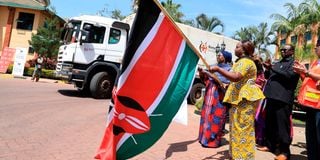Over 4m people face starvation as drought persists in arid areas

Ms Dorcas Rigathi flags off relief food at the Kenya Red Cross headquarters on October 14, 2022. With her is the institution's secretary-general Dr Asha Mohammed.
What you need to know:
- Kenya Red Cross secretary-general, Dr Asha Mohammed, said that the number has risen from three million early this year to four million.
- Deputy President Rigathi Gachagua’s wife, Dorcas Rigathi, said nine counties are the worst affected by drought and thus classified as the red zone.
- According to the National Drought Management Authority, over 1.2 million livestock have died due to drought caused by failed four rainy seasons in arid and semi-arid counties.
The number of people at risk of starvation has risen to over four million as the government says nine counties are in dire need of food.
Kenya Red Cross secretary-general, Dr Asha Mohammed, said that the number has risen from three million early this year to four million.
She warned that the number of people in need of help might surpass 4.5 million by the end of the year given that the October-November-December rains are projected to be inadequate.
“This is the worst drought to hit the region in over 40 years. As the drought continues to intensify, the needs of the community continue to increase,” she said.
Deputy President Rigathi Gachagua’s wife, Dorcas Rigathi, said nine counties are the worst affected by drought and thus classified as the red zone.
They are Laikipia, Isiolo, Mandera, Garissa, Turkana, Wajir, Nyeri, Samburu and Marsabit.
Another 14 counties, Kitui, Tana River, Tharaka Nithi, Makueni, Meru, Embu, Narok, Taita Taveta, Kajiado, Kwale, Kilifi, Baringo, West Pokot and Lamu, are categorised as the yellow zone.
Mrs Rigathi was speaking at an event at the Red Cross headquarters yesterday, where together with Dr Mohammed, flagged off over 11 tonnes of relief food donated by different organisations. The food will be delivered to areas affected by drought in Narok County.
“I wish to call all Kenyans of goodwill to rise to the great need of saving the lives of our people,” she said.
Livestock deaths
According to the National Drought Management Authority, over 1.2 million livestock have died due to drought caused by failed four rainy seasons in arid and semi-arid counties.
But as various agencies distribute relief food, a section of residents from Isiolo’s Wabera, Bulapesa and Burat wards have alleged discrimination.
Governor Abdi Ibrahim Guyo on Tuesday flagged off a consignment for 24,000 hunger-stricken households across the county’s 10 wards that were to each to benefit with six kilos of maize flour, five kilos of rice and a litre of cooking oil.
Irate residents demanded that an investigation be done and action taken against chiefs, village elders and county administrators who spearheaded the exercise in areas where complaints have been reported.
Janerose Abiki from Tum village in Aremiet sub-location said the majority of needy families in the area did not benefit from the provisions that she claimed were distributed at night.
“We camped here (outside county assembly offices) to protest the action because we did not receive any food,” she said.
The drought, they said, had exposed them to suffering as the majority of their animals were emaciated and some had started dying due to lack of water and pastures.
In Nyandarua, it is a double tragedy for farmers who diversified from potato to maize after massive crop failure.
The farmers shifted to maize due to the high cost of producing potatoes, which has been the main cash crop after the collapse of the pyrethrum and dairy industries in the 1980s.
Potato shortage
The diversification has caused an acute shortage of potatoes with a 20-kilo bucket selling at Sh800.
Mr George Rugene from Kaimbaga in Ol Kalou is among the affected growers. “Growing an acre of potato cost me more than Sh40,000 due to the high cost of inputs like fertiliser. The maize crop has failed due to shortage of rains, most families are starving in Kaimbaga and in need of urgent food aid,” said Mr Rugene.
Archbishop Josam Kariuki of the Nyandarua Interfaith Council said churches have set up special Sundays for raising money to support starving families.
A survey by the county department of agriculture shows that by July, about 40,000 families were starving.
Interestingly, Nyandarua is listed among food baskets in Kenya
Elsewhere, during the Marsabit County weather Forecast Forum on Thursday, three traditional weather experts took part in the process.
A Borana traditional weather expert Guyo Sora from Sololo in Moyale predicted that the county would receive suppressed rainfall.
He said the rains were likely to start during the first week of November or late in October and end in the first week of December.
In Samburu, the dry conditions mean that women and girls are being put at an increased risk of gender-based violence.
According to Samburu Women Trust, security risks to girls and women have increased in the past two years as a result of the drought.
Executive director Jane Meriwas said more women have been subjected to violence including rape, sexual exploitation and domestic abuse during the drought period.
“The rate of gender-based violence is alarming as drought bites. Many women are suffering in silence,” says Ms Meriwas.
Ms Meriwas said many women have turned to illicit brewing, charcoal burning and prostitution for survival as broken families increase.
She said at least 375 women mostly gender violence survivors are affected by drought and have received Sh8,886 each in form of cash transfers.
Samburu Governor Jonathan Lelelit has called for humanitarian assistance to tackle the drought to save lives and livestock.
In Narok over 115,000 pastoralists are at risk of starvation and are in dire need of humanitarian relief
Area county commissioner Isaac Masinde and Governor Patrick Ntutu revealed that parts of the county were at risk of starvation as rains have failed.
Sylvia Muia, Waikwa Maina, Waweru Wairimu, Jacob Walter, Geoffrey Ondieki, Robert Kiplagat and Steve Njuguna.





